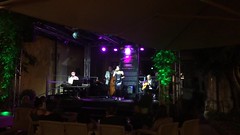
- Image via Wikipedia
Thus begins a series of posts on themes related to myths and legends on education, elearning and similar beasts. It will be a series of posts because I like the idea of cutting down to pieces some thoughts I have been accumulating around the world of teaching and learning. Also, I have been inspired by the many bloggers who have posted series on many subjects. I enjoyed quite much the idea of Jim Groom‘s 100-days-to-XMas series of last year, for instance. So, here’s the first post of the series. Later I’ll find a name for it.
The Myths of Teaching and Learning -Or so I think.
Myth 1 – Teaching and Learning
The first myth comes from the dysfunctional idea we have built of teaching and learning, and mostly of learning. Let’s begin with Learning. We talk today of anytime learning, of mobile learning, of whatever learning. Of course, we do have mobile learning. And certainly we do learn at any moment of our lives. Or we’d be dead.
Still, I prefer to think of learning in just a dual way. Essentially, we learn either consciously (when we are aware of our own learning, and because we chose to learn something) or unconsciously (sorry for my unschooled psycho terminology, but I hope I can give the idea). Let’s make an example.
When we were babies, we learned language. Without any conscious effort (still, with a lot of effort!) but we did learn first to understand spoken utterances, then to replicate them, and then to formulate our own. That’s a lot of learning, all of which we were completely unaware of. Actually, we managed to learn all that stuff without a teacher! We had a professional mother or equivalent, but not a person who consciously tried to teach us the language. Of course sooner or later, mother or father came down with their ridiculous efforts to have us learn some specific thing or sentence or whatever… but that doesn’t count.
Second example: please bear with me, I’ll get to my point.
Later in life, perhaps as a teenager, you decided you liked Astronomy and you bought a wonderful book. You read it, and you started to learn about wonderful concepts. You connected some of these concepts to earlier known facts (for instance, the explosion of supernovae with the dinosaur age), and you began forming an idea of your appreciation of Astronomy. Perhaps you developed the wish of visiting an observatory. Thus, you learned something out of your reading pleasure. Again, no teacher involved. (Should I begin to worry?) But you learned because of a volition act: you made a conscious effort to read and know more on a subject. You didn’t equate at the time learning with knowing or understanding, and even if we may want to leave the philological discussion elsewhere, we must admit the three concepts are very much interconnected.
Still, when someone asked you about light-years, you could not explain what they are. So, you discovered a bug in your learning, or better, you realized you hadn’t learned something, or that you hadn’t understood it completely, which in my opinion is very close to learning, if not identical. [In fact, some people, of whom I remember Winograd, say that the breakdown moments are the essential moments that lead to analysis and ultimately learning.] You then went back yo your book and decided that this time you wanted expressly and affirmatively to know and learn what light-years were. This time then the full learning experience is happening within our sphere of awareness. We agree it’s learning, but some extra ingredient was needed, because reading by itself was not enough. Perhaps not even some elementary explanation from a teacher or parent was not enough. (Perhaps it was, but then you would easily think of another example). You had to go beyond reading. You had to study.
Same happened at school, where we were explicitly asked to study (as a prerequisite to learn). Unfortunately, the “study” word is not much used in the US mainstream education. Thus, students are not often asked to study explicitly, but they are sometimes convinced by lazy school systems that they will learn within the classroom (by virtue of some magic “delivery” process of knowledge chunks from their teachers onto their minds/brains).
This is the first myth: in our western/americanized culture we talk a lot of learning and teaching, but rarely of the conscious act of studying because one wants to learn something. Studying may mean reading thoroughly and deeply and forming networks of concepts interconnected with one another and with previously known ideas. It may involve discussing, dialoguing, practicing and all, but it always implies effort. Our schooling system, with its wish to talk about how easy and fun it is to learn, forgets this simple truth. With this, the education systems forgets that students need to be exposed (like Jim Groom philosophically expressed it just this very afternoon) to material they elsewhere would not be exposed to!
Learning can happen 24/7, everywhere, under any conditions. But most of the time, it means effort. We may say mobile studying, anytime studying, but please leave mobile learning to the realm of oxymora.
Learning, it’s known, won’t let itself be delivered. But that’s another myth.








